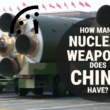Where proliferation concerns ring hollow
By Gilberto M. Jannuzzi, April 26, 2012
To Latin Americans, who live in a relatively peaceful region, the international community's concerns about the proliferation of nuclear weapons can sound a bit strange. Latin America has been a nuclear-weapon-free zone since since 1969, when the Treaty of Tlatelolco entered into force. All countries in the region, in addition to being signatories to that treaty, are also parties to the Nuclear Non-Proliferation Treaty (NPT). Given all this, proliferation just does not seem a pressing concern to most people in Latin America.
Brazil, my own country, became a party to the NPT in 1998 as a non-nuclear weapon state. (After adopting a new constitution in 1988, the country had renounced previous efforts toward developing nuclear weapons.) But participation in the global and regional nonproliferation regimes does not mean that Brazil has no legitimate interest in developing its domestic capacities in nuclear technology.
Brazil has managed over the last 40 years to create a domestic nuclear industry, with the exception of civilian nuclear power technologies, and has developed its own technology to enrich uranium for use in nuclear submarines. Indeed, it is because of issues surrounding its naval nuclear fuel program that Brazil has not signed the 1997 Additional Protocol to the NPT. This highlights a problem with the international nonproliferation regime: International treaties can limit the scope of individual countries' legitimate nuclear aims. They can also have the discriminatory effect of locking signatories into perpetual status as purchasers of technology.
Meanwhile, Brazil's experience with nuclear electricity generation has been costly and full of pitfalls, to say the least. Construction on Brazil's first nuclear plant, ANGRA I, began in 1971, but the facility only started to operate commercially in 1985. The total cost is officially reported as $2 billion, but several analysts contend that this figure is conservative. A second plant, ANGRA II, began operating in 2000, though work on the facility had begun all the way back in 1976. Work on a third plant, ANGRA III, began in 1984, but was halted for many years. Construction started again only in 2009 and is not expected to be concluded until 2015, with a final cost projection of nearly $6 billion.
Currently, nuclear energy accounts for less than 3 percent of Brazil's total electricity production. This number could increase if the government goes ahead with plans for four additional plants as envisioned in National Energy Plan 2030, but would rise to only about 4 percent in 2030 (depending on demand scenarios). In any event, the disaster at the Fukushima Daiichi Nuclear Power Station has caused the government to review its plans for nuclear energy, and it is very likely that National Energy Plan 2035 will drastically reduce the nuclear capacity previously projected.
Construction of Brazil's existing nuclear facilities has been accompanied by public protest, weak political leadership, and unclear priorities in energy policy. The drastic variations in nuclear policy that the country has experienced at the highest levels carry significant implications — changes in priorities have caused plant construction to be postponed or halted, leading to greater final costs for the electricity generated.
Lack of political continuity has also interrupted Brazil's efforts to build up its domestic human resources. Nuclear energy is a very specialized and sophisticated technology. It requires a cadre of people trained in safety, operations, maintenance, and other aspects of the production chain. Putting all this in place takes time and sustained effort. And in Brazil, issues such as public safety and waste management still need to be more fully addressed and more systematically reviewed, both by the authorities and through public consultation.
In Latin America, nuclear weapons proliferation is a highly regulated issue that is overseen by trusted local and international bodies. Meanwhile, I continue to believe that not much room exists for nuclear energy to achieve greater importance in electricity production, either in Brazil or in most of Latin America.
Topics: Nuclear Energy, Nuclear Weapons
Share: [addthis tool="addthis_inline_share_toolbox"]














